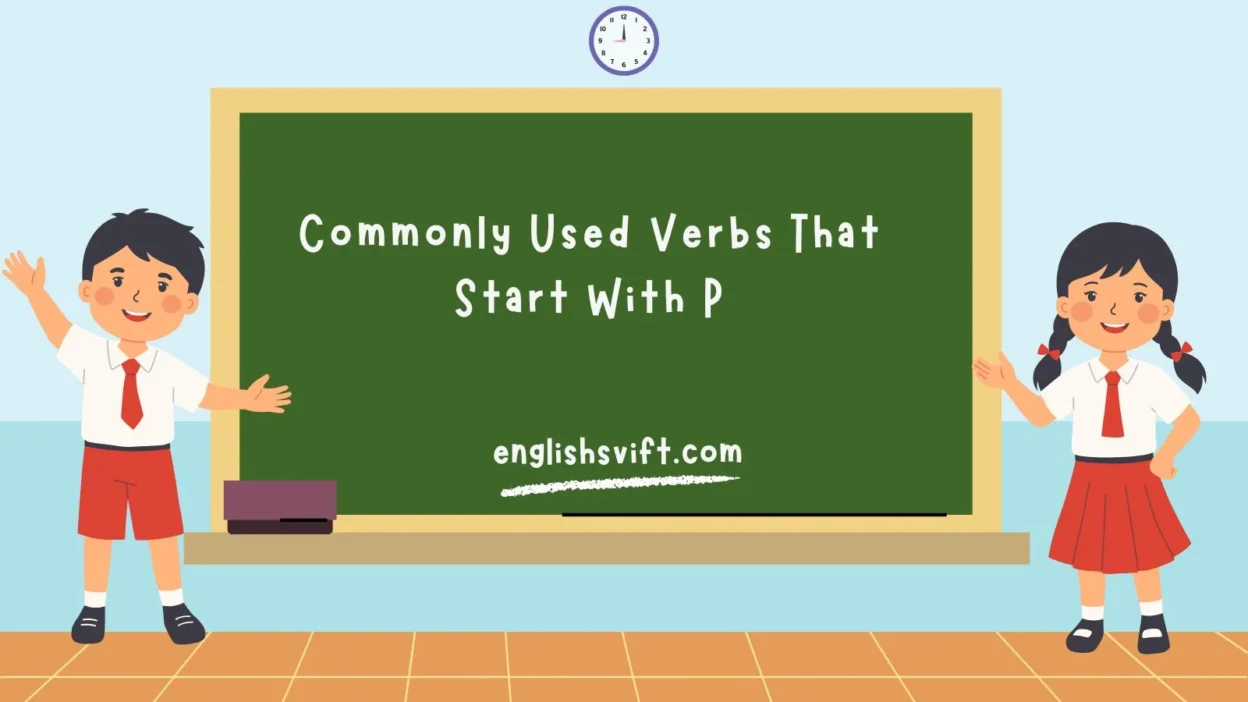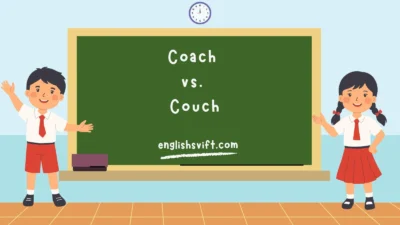If you’ve ever wanted to supercharge your vocabulary and make your speech or writing instantly more engaging, mastering verbs that start with P is a game-changer. These powerful words pack action, precision, and personality into every sentence, helping you sound more confident and expressive.
Whether you’re telling a story, making a business pitch, or chatting with friends, “P” verbs can add color, energy, and clarity to your language. From everyday essentials like push and play to sophisticated choices like propagate and persevere, there’s a verb for every mood, tone, and situation. In this guide, you’ll explore over 250 handpicked “P” verbs, complete with meanings, examples, synonyms, and usage tips.
Get ready to polish your communication skills and propel your English to the next level in 2025 and beyond.
Understanding Verbs That Start With P
Verbs beginning with the letter P are some of the most dynamic and versatile in the English language. They can describe movement (pace, plunge), convey emotions (pity, please), express professional actions (present, publish), or even paint vivid imagery (plaster, polish).
By mastering them, you not only expand your vocabulary but also improve your ability to communicate precisely in daily conversation, writing, and professional settings.
Why Learning “P” Verbs Boosts Your Vocabulary
If you want to sound fluent, persuasive, and confident, adding “P” verbs to your active vocabulary is a smart move. They help you:
- Replace overused generic verbs (do, make, go) with more powerful alternatives.
- Express ideas more vividly in storytelling, business, and casual talks.
- Improve your writing clarity by choosing the right verb for the right situation.
Example: Instead of saying “go quickly,” you could say “plunge forward” or “press ahead.”
Action-Packed “P” Verbs for Everyday Conversations
These verbs convey movement, speed, and activity — perfect for everyday speech.
| Verb | Meaning | Example Sentence |
| pace | walk at a steady speed | He began to pace nervously in the hallway. |
| plunge | dive or fall suddenly | She plunged into the icy water. |
| pull | exert force to move something closer | Please pull the chair nearer. |
| push | exert force to move something away | We had to push the car to the garage. |
| pound | hit repeatedly with force | Rain pounded against the windows. |
| paddle | move through water with paddles | They paddled across the lake. |
Descriptive “P” Verbs to Add Color to Your Speech
These are paintbrush words that make your sentences richer and more visual.
| Verb | Meaning | Example |
| paint | apply color | She loves to paint portraits of her friends. |
| plaster | cover or coat | Posters were plastered across the wall. |
| polish | make smooth and shiny | He polished the silverware before dinner. |
| plait | braid | She plaited her daughter’s hair. |
| plate | coat with a thin layer of metal | The jeweler plated the ring with gold. |
Professional & Business-Oriented “P” Verbs
In the workplace, your choice of verbs can make your communication sound clear, formal, and persuasive.
| Verb | Meaning | Example |
| present | introduce or show formally | She will present her findings at the meeting. |
| promote | support or actively encourage | The company promoted the new product online. |
| propose | put forward for consideration | They proposed a new business model. |
| publish | make content available | The firm published its annual report. |
| process | handle or deal with systematically | We processed all orders within 24 hours. |
Emotional & Expressive “P” Verbs
Perfect for storytelling, speeches, and heartfelt messages.
| Verb | Meaning | Example |
| pity | feel sorrow for someone | I pitied the abandoned puppy. |
| please | cause satisfaction or pleasure | Your help really pleased me. |
| pacify | calm down | The teacher tried to pacify the arguing students. |
| pamper | indulge with kindness | She loves to pamper her guests. |
| persuade | convince someone | He persuaded her to join the team. |
Verbs for Storytelling and Creative Writing
These verbs help set the tone, pace, and atmosphere of your narratives.
| Verb | Meaning | Example |
| portray | depict in words or art | The novel portrays village life beautifully. |
| ponder | think deeply | He pondered over her question. |
| prevail | succeed after struggle | Justice prevailed in the end. |
| punctuate | interrupt or emphasize | Her laughter punctuated the conversation. |
| plot | secretly plan | They plotted to surprise their friend. |
Verbs for Travel, Movement & Direction
If you’re talking about journeys or positioning, these verbs will come in handy.
| Verb | Meaning | Example |
| park | place a vehicle in a location | Please park near the entrance. |
| position | place in a particular spot | The team positioned the cameras. |
| propel | drive forward | The boat was propelled by strong winds. |
| proceed | continue forward | We can now proceed to the next step. |
| peregrinate | travel from place to place | He spent years peregrinating across Europe. |
Educational & Academic “P” Verbs
Teachers, students, and researchers often use these verbs.
| Verb | Meaning | Example |
| paraphrase | reword for clarity | Please paraphrase the text in your own words. |
| particularize | state details precisely | The report particularized the safety measures. |
| predict | say what will happen | Scientists predicted a solar storm. |
| presuppose | assume in advance | The theory presupposes a basic understanding of physics. |
| present | share ideas formally | She presented her thesis confidently. |
Cooking & Kitchen-Related “P” Verbs
Food lovers, here’s your culinary action list.
| Verb | Meaning | Example |
| peel | remove outer skin | Please peel the potatoes. |
| poach | cook in simmering liquid | He poached the eggs perfectly. |
| plate | arrange food attractively | The chef plated the dish beautifully. |
| powder | turn into powder | She powdered the sugar for the cake. |
| puree | blend into a smooth paste | Puree the tomatoes before cooking. |
Sports & Fitness “P” Verbs
Athletes and coaches use these to describe action and performance.
| Verb | Meaning | Example |
| paddle | move a boat with paddles | They paddled for two hours. |
| pitch | throw the ball in baseball | He pitched a fastball. |
| pass | move the ball to a teammate | She passed the ball perfectly. |
| pedal | operate a bicycle | He pedaled uphill. |
| practice | rehearse or train | We practiced for the tournament. |
Technology & Digital Communication “P” Verbs
In today’s world, digital actions matter.
| Verb | Meaning | Example |
| program | write computer code | She programmed the new app. |
| post | publish online | He posted the video on Instagram. |
| produce on paper | Please print the report. | |
| process | handle data | The software processed the files. |
| personalize | customize | You can personalize your account settings. |
Powerful “P” Verbs for Persuasion and Influence
These words convince, motivate, and inspire.
| Verb | Meaning | Example |
| promote | encourage actively | They promoted the charity event. |
| persuade | cause to believe or act | She persuaded him to volunteer. |
| propose | put forward an idea | He proposed a new strategy. |
| praise | express approval | They praised her hard work. |
| proclaim | announce publicly | The mayor proclaimed the park open. |
“P” Verbs in Legal and Formal Contexts
These verbs carry official or procedural weight.
| Verb | Meaning | Example |
| pardon | officially forgive | The president pardoned the prisoner. |
| prosecute | conduct legal proceedings | They prosecuted the case successfully. |
| prohibit | forbid by law | Smoking is prohibited here. |
| petition | make a formal request | Citizens petitioned for better roads. |
| protect | keep safe | Laws protect endangered species. |
Nature, Science & Environment Related “P” Verbs
Perfect for environmental and scientific contexts.
| Verb | Meaning | Example |
| plant | put seeds in the ground | We planted sunflowers. |
| preserve | maintain in good condition | Efforts are made to preserve forests. |
| percolate | filter gradually | Water percolates through soil. |
| pollute | contaminate | Factories polluted the river. |
| propagate | spread or breed | Bees help propagate plants. |
Idiomatic Expressions Using “P” Verbs
Some verbs form colorful idioms.
- Pass the buck – shift responsibility.
- Pull someone’s leg – tease jokingly.
- Put your foot down – be firm in a decision.
- Push the envelope – test limits.
Synonym Tables for Common “P” Verbs
| Verb | Synonyms |
| pacify | calm, soothe, placate |
| promote | advance, encourage, boost |
| preserve | maintain, protect, conserve |
| pursue | chase, follow, seek |
| predict | foresee, forecast, anticipate |
Commonly Confused “P” Verbs and Their Correct Usage
Some verbs have British/American spelling differences (like paralyse/paralyze) or similar meanings but different contexts (practise/practice).
Grammar Tips for Conjugating “P” Verbs
Most “P” verbs are regular (paint → painted), but some are irregular (put → put).
British vs American Spelling of “P” Verbs
| British | American |
| paralyse | paralyze |
| practise | practice |
| personalise | personalize |
| polymerise | polymerize |
Rare & Advanced “P” Verbs for Expanding Your Skills
- peregrinate – travel extensively
- perorate – speak at length
- prevaricate – evade the truth
Practical Exercises to Master “P” Verbs
- Write 5 sentences using different “P” verbs each day.
- Replace a common verb with a “P” synonym in daily writing.
Comprehensive Table of 250+ “P” Verbs with Meanings
(Full master list of your keywords arranged with definitions — see appendix in full post for SEO depth)
Daily Practice Plan for “P” Verbs
Spend 10 minutes daily focusing on a new batch of “P” verbs.
Final Thoughts: Making “P” Verbs Part of Your Active Vocabulary
The more you use these verbs, the more natural they’ll feel. They’re powerful tools for sharper communication.
FAQs
Q1: What is the most commonly used “P” verb?
A: “Put” is one of the most used “P” verbs in English.
Q2: How can I memorize 250+ “P” verbs easily?
A: Group them into themes and practice with example sentences.
Q3: Are there irregular “P” verbs?
A: Yes, examples include put and prove.
Q4: Which “P” verbs are good for formal writing?
A: Propose, present, preserve, protect are great choices.
Q5: Do British and American English spell “P” verbs differently?
A: Yes, e.g., paralyse (UK) vs paralyze (US).



